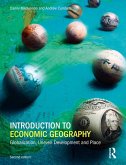This book explores how various social institutions and technologies historically generated enormous improvements in transportation and communications that produced transformative reductions in the time and cost of interactions among places, creating ever-changing geographies of centrality and peripherality. Warf invokes a global perspective on early modern, late modern, and postmodern capitalism. He makes use of data concerning travel times at various historical junctures, maps of distances between places at different historical moments, anecdotal analyses based on published accounts of people's sense of place, examinations of cultural forms that represented space (e.g., paintings), and quotes about the culture of speed.
Warf shows how time-space compression varies under different historical and geographical conditions, indicating that it is not one, single, homogenous process but a complex, contingent, and contested one. This book will be useful book for those studying and researching Geography, History, Sociology, and Political Science, as well as Anthropology, and Philosophy.
Dieser Download kann aus rechtlichen Gründen nur mit Rechnungsadresse in A, B, BG, CY, CZ, D, DK, EW, E, FIN, F, GR, HR, H, IRL, I, LT, L, LR, M, NL, PL, P, R, S, SLO, SK ausgeliefert werden.









